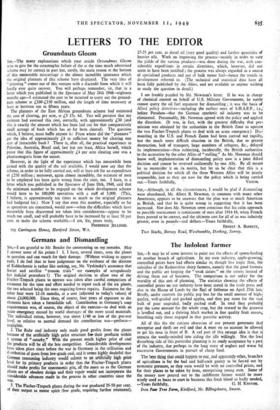Germans and Dismantling
am grateful to Mr. Bender for commenting on my remarks. May I answer some of his points ? 1. I have, several times, seen the plants in question and can vouch for their damage. (Without wishing to appear rude, I do feel that to base judgement on the evidence of the director of Kohlechcmie is rather like seeking, say, Mr. Vyshinsky's assurance that Soviet and satellite " treason trials " are examples of scrupulously fair judicial procedure I) The original decision to allow two of the Fischer-Tropsch plants to operate was taken after careful comparison of estimates for the time and effort needed to repair each of the six plants, the two selected being the ones requiring fewest repairs. Estimates for the other four were 12-24 months, at a cost (adjusted to today's values) of about £6,000,000. Since then, of course, four years of exposure to the elements have taken a formidable toll. Contribution to Germany's soap requirements was, of course, the object of the exercise—to deal with an acute emergency caused by world shortages of the more usual materials. The individual ration, however, was about 1/40 or less of the pre-war level, so relative to normal demand the contribution was—perforce- negligible.
2. The Ruhr coal industry only made good profits from the plants because of the artificially high price structure for their products within a system of " autarky." With the present much higher price of coal the products will be all the less competitive. Considerable developments have taken place since before the war in Germany in the utilisation and distribution of gases from low-grade coal, and it seems highly doubtful that German consuming industry would submit to an artificially high price level for its primary products in order that the Fischer-Tropsch plants should make profits for uneconomic pits, all the more so as the German Plants are of obsolete design and their repair would not incorporate the considerable advances made in the process in other countries since the War.
3. The Fischer-Tropsch plants during the war produced 35-50 per cent. of their output as motor spirit (low grade, requiring further treatment), 17-25 per cent. as diesel oil (very good quality) and further quantities of heavier oils. Work on improving the process—mainly in order to vary the yields of the various products—was done during the war, with con- siderable expeditions in certain directions, which, however, did not seem to have been justified ; the process was always regarded as a source of specialised products and not of bulk motor fuel—hence the trends in development referred to. (The technical and statistical data have all been fully published by the Allies, and are available to anyone wishing to study the question in detail.) I am frankly puzzled by Mr. Newman's letter. If he was in charge of chemical control on behalf of U.S. Military Government, he surely cannot query the oil fuel argument for dismantling ; it was the basis of Allied policy directives—including the earliest ones of S.H.A.E.F., i.e.,' before Potsdam—that the German synthetic oil industry was to be eliminated. Presumably, Mr. Newman agreed with the policy and applied the directives. (It was, in fact, with the greatest difficulty that per- mission was obtained by the authorities in the British Zone to operate the two Fischer-Tropsch plants to deal with an acute emergency.) Di a= mantling in the U.S. and French Zones had been carried out rapidly, but the much more difficult situation in the British, due to greater destruction, lack of transport, large numbers of refugees, &c., delayed its implementation—thus subjecting, incidentally, the British authorities to the accusation by the other Allies of " stalling." As Mr. Newman should know well, implementation of dismantling policy now is a joint Allied decision and cannot be reversed unilaterally by one Ally. By all means let us reconsider it on its merits, but let us be clear that this is a political decision for which all the three Western Allies will be jointly responsible, just as they are now for the policy which is being carried


































 Previous page
Previous page